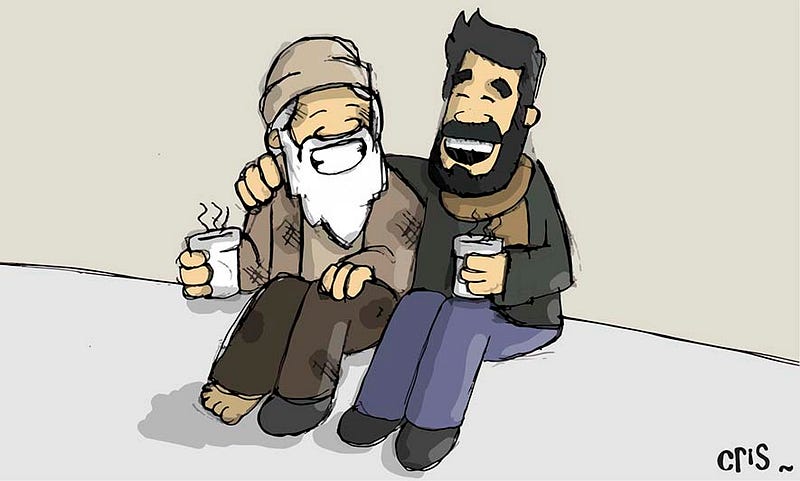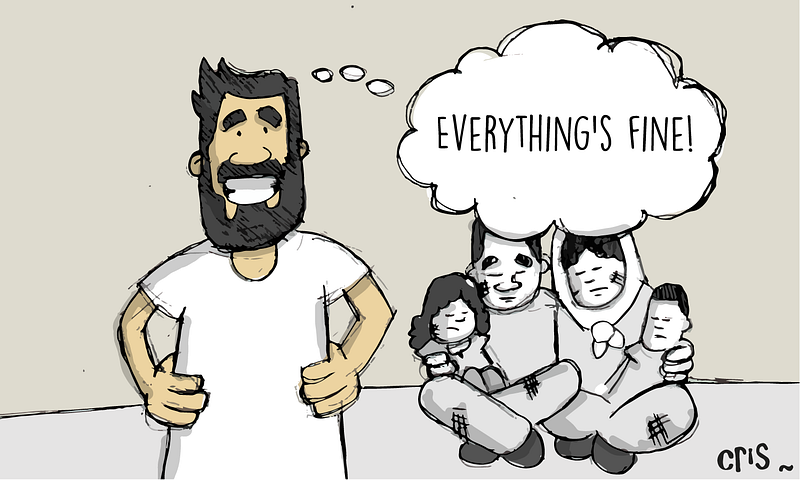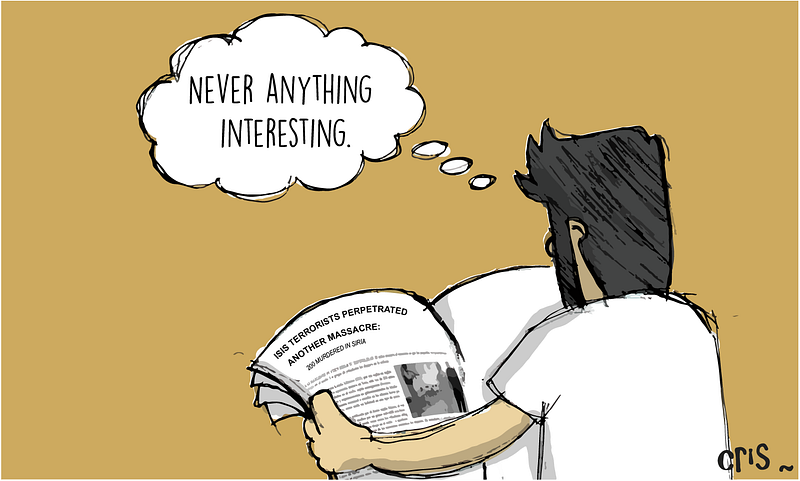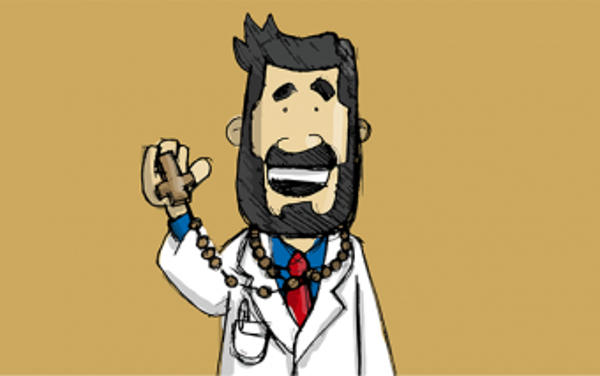For many people, today’s society has radically changed. We’ve gone from traditional marriage to other forms of civil union, from the defense of life to abortion, and from freedom of expression to public censure and even jail. We know that men change constantly, but, is it possible that we have transformed into such an indifferent society in just a few years’ time?
But to the Christian — take hope — we still have time! If we take into account these 7 ills of society, we can sow love around us. Below, we name each sickness and the biblical key to its healing.
1. “Miserly solidarity”

If we are asked for money on the street, we frequently give it. If someone needs help or an old lady asks for our arm to cross the street, we assist them. However, if this occurred in silence, not in the public life, would we do it with the same willingness? We give, partially as if with an escape hatch, but we’re not interested in the actual person who’s asking. We lend but we don’t see beyond that act. Our actions stay in the moment. That’s why I dare to say that today’s society is miserly in solidarity (or, perhaps, sparingly generous), because we do give, but we don’t give how we should. If only we listened to Jesus when he says:
“Whoever sows sparingly will also reap sparingly, and whoever sows generously will also reap generously. Each of you should give what you have decided in your heart to give, not reluctantly or under compulsion, for God loves a cheerful giver. And God is able to bless you abundantly, so that in all things at all times, having all that you need, you will abound in every good work”(2 Corinthians 9, 6–8).
2. “Sociable Individualism”

We are social beings. Even when we wish it weren’t the case, we need others to survive. Just consider the popularity of “social networks” — we’re naturally drawn to these ways of connecting. This “being sociable” demands certain behaviors from us as individual members of a collective of people (society). But, how much do we care about the other members of society? We need only to glance at today’s relations between neighbors or schoolchildren to recognize that we are drifting further and further away from one another. We live in a state of masked individualism. Observe it: on a bus, 20 years ago, people talked to one another even if they didn’t know each other, to make the ride more enjoyable. Today we see a very different scene: kids, teenagers, and adults who have their eyes glued to the screen, their ears to their headphones and their minds to themselves. But scripture reminds us (what we ought to intuitively know):
“Anyone who does not provide for their relatives, and especially for their own household, has denied the faith and is worse than an unbeliever.” (1 Timothy 5,8).
3. “Superficial depth”

These days, the defense of human rights and the fight for political or social causes has been the strongest. Apparently, the liberty flag is raised. But if we think about it, do you really risk it all to defend a common cause, or do you seek only your own well-being? We think that this urge to vindicate our “rights” makes us love men more, makes us philanthropic. Then again, we don’t see that the great majority only indulge in their own interests. We want to find refuge in something deeper like the right to decide, for example. However, this only makes the distances between one another wider and it makes us fall unfailingly into a superficiality with the appearance of transcendence. The true depth of men is found in God. He’s the one who can fill up our hearts. Looking for the profound anywhere else but in God, we end up stumbling upon things like Reiki, Yoga or Tai-chi. St. Augustine says: “Thou madest us for Thyself, and our heart is restless, until it repose in Thee.”(Confessions, 1.1). Here lies the deep truth of our sonship in God. Our heart seeks for Him, and only in Him will it find its completeness.
“I sought the Lord, and he answered me; He delivered me from all my fears.” (Psalm 34.4).
4. “Frustrated happiness”

Every time that a new achievement of “progress” is accomplished through the law, such as divorce or abortion, society (though thankfully not everyone) seems to rejoice. Soon enough, crowds are out in the streets celebrating their victory. Days go by and the unsatisfied longing returns. The thing is, a law that passes, a granted whim, or a gratified desire does not give men a lasting happiness. We Christians know well that happiness only exists when our life is founded on something infinite. Can there be anything bigger than God? No! That’s why, if our life is based on material things, or even on social causes and “progress,” we will be miserable. If our life is founded on carnal pleasures, our future is unhappy. Our complete happiness has its root only in God.
“Though the fig tree does not bud and there are no grapes on the vines, though the olive crop fails and the fields produce no food, though there are no sheep in the pen and no cattle in the stalls, yet I will rejoice in the Lord, I will be joyful in God my Savior. The Sovereign Lord is my strength…” (Habakkuk 3.17–19).
5. “Unmotivated optimism”

“Let’s go, we can do it!”, many say. It’s a phrase that inspires, that motivates. But with all that we have unfolded: indifference, individualism, search for personal satisfaction… I’m not sure that we live in an optimistic world. My judgement is that many live wholly unmotivated lives of inertia. They hide behind this pseudo-optimism based on slogans and pretty sentences, in order to avoid facing reality. This kind of optimism is temporal. As ice melts under the full sun, these sloganed motivations evaporate. We live by short term goals. “Now I will get promoted”, “now I will get to the next level on this video game”, “now I will finish my PhD”. And then what? Again, we’ll search for a new aim that motivates us to keep living. We would save all that trouble if we trusted God and accepted that He is right, that the Church is right. That’s when the theological virtue of Hope comes in, as the Catechism states:
“Hope is the theological virtue by which we desire the kingdom of heaven and eternal life as our happiness, placing our trust in Christ’s promises and relying not on our own strength, but on the help of the grace of the Holy Spirit. “Let us hold fast the confession of our hope without wavering, for he who promised is faithful.” (Hebrews 10, 23)” (CCC 1817).
6. “Enslaved freedom”

Tell me that sin does not enslave. It is so clear in the Bible. Hate generates hate, war brings with it more war, slavery causes more slavery, and so on. Not everything we want makes us free. Just looking at people on the streets, most of them walk holding their phones. It’s an addiction, an enslavement. When that which I use turns against me and it appears I’m being used by it, that’s when we talk about slavery. It’s not only about literal human trafficking, since today we have other types of slavery. If the internet, technology, money, or consumerism make you dependent, then you are their slave. It’s this slavery that’s even being publicly defended today: “I have the right to…”, “I want this or that”… Do I have the right to abuse of things and people to the extent of using / instrumentalizing them? Do I have the right to lose my freedom to pleasures, to my “wants”, or to whatever I fancy? Think about it… maybe it’s time to let Jesus heal you and to achieve the true freedom of God’s children.
“That the creation itself will be liberated from its bondage to decay and brought into the freedom and glory of the children of God.” (Romans 8,21).
7. “Preoccupied indifference”

We are attentive to (and therefore distracted by) everything. That a farm had caught on fire in Australia, that a gorilla escaped in Japan, that a new car came out in Austria. With technology, communication is ubiquitous, faster and easier. Still, are we truly worried about all of that or is it simply an addiction to “novelty”? I wouldn’t be surprised if the answer were the latter. That thousands of Christians are dying in the Middle East, that there’s a lack of food and water in Africa, that the Church is being taken to trial for defending her rights… what about this news… does it really worry us? Are we after what’s more convenient to us or what really deserves our attention? While the media shows us the “dark side” of life, real problems that require our response have no way of coming to light. We’ll be forever indifferent if we only regard ourselves and our interests. When we manage to finally look at our brothers with love, that’s when a new life will start. John said it already:
“Dear children, let us not love with words or speech but with actions and in truth.” (1 John 3.18). And in another passage of scripture from St. Paul, we read: “Carry each other’s burdens, and in this way you will fulfill the law of Christ (…) Therefore, as we have opportunity, let us do good to all people, especially to those who belong to the family of believers.” (Galatians 6, 2–10).
And a bonus track… “Temporarily spiritual”.
Here we find a phenomena that’s becoming more and more frequent. Those who step away from the “world” to seek a greater peace and tranquility often turn to alternative methods of spiritual pacification. One, two, and three sessions are not usually enough to connect with the transcendent. Of course it’s not since that’s not the solution! If you want to really get closer to your spiritual side, you should get closer to the Truth that we have mentioned before. This Truth is God and this peace of the soul is achieved when one is reconciled with Him, when we love our brothers, when we concern ourselves with building a better world. Otherwise, we’ll constantly look back, we won’t advance. If you want to get away from the earthly, from pleasures, from consumerism, turn to God.
“So I say, walk by the Spirit, and you will not gratify the desires of the flesh. For the flesh desires what is contrary to the Spirit, and the Spirit what is contrary to the flesh. They are in conflict with each other, so that you are not to do whatever you want. Since we live by the Spirit, let us keep in step with the Spirit.” (Galatians 5, 16–17, 25).
I hope that these 7 points can help us to better understand the world we live in from a Christian point of view, so that we may be encouraged to search unceasingly for Heaven’s goods. The world can be very tempting but it’ll never defeat whomever is fixed in God’s love. Like Saint Paul said: “Who shall separate us from the love of Christ? Shall tribulation, or distress, or persecution, or famine, or nakedness, or danger, or sword?” (Romans 8. 35). Nothing nor no one will tear us from the love of the Lord!
Written by Brother Edgar Henríquez Carrasco, LC. in Spanish for Catholic-Link.com
Traslated by Maria Isabel Giraldo









![Pertenezco al RC+ [ad]](https://blogger.googleusercontent.com/img/a/AVvXsEio3lINjwzD9Sb-1SQRwUrBtknS1rEWmB5wOovW0Eef8tYfASgLq75jo4YCXriT7o10ve3UpsxJSxd047rckLeQsaDHExxZdUC1GPf7Yim8Spy3EhRjBpXZba3-od_nKoLuGqXvozCY-5FHUNNk_pn137h2qyr6jwfO-npRRL1Dm_HPvztvme7itXkW0w=s500)
Comentarios